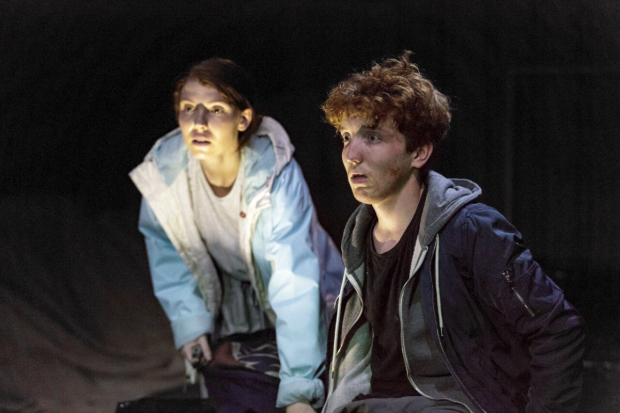Cargo (Arcola Theatre)

© Mark Douet
Can you turn the refugee crisis into a potboiler thriller? No matter how good the intentions of Cargo – and its writer Tess Berry-Hart is a founding member of the Calais Action collective that delivered aid to the Jungle migrant camp – there’s something unpalatable about a play that wrings the tension from human trafficking, but abstracts it from the reality.
The stowaways concealed in a shipping container are fleeing a country torn apart by civil war: England. Joey (Milly Thomas) and her brother Iz (Jack Gouldbourne), both young and desperately vulnerable, have left their seaside hometown to loyalist fighters, fleeing its lynch mobs and vigilante squads, and talked their way aboard. Their idea of Europe is a picture postcard; a place where pipe dreams seem possible. Their fellow passenger Sarah (Debbie Korley), on the run from rebels in the north, has a more realistic outlook. Wired and wary, she’s secured herself a fake passport and paid for her passage. Sarah’s right to be concerned. The trio aren’t alone.
Cargo might throw the situation faced by refugees into sharp relief, pressing us to see ourselves in the reality, but it lends Cargo the feel of a post-apocalyptic disaster movie. Berry-Hart almost has too much fun concocting a broken Britain where scavengers roast seagulls on open fires and rebels storm rural communities in the North. Frankly, with the reality of refugees so close at hand, with real people hidden in cargo crates, the dystopian fantasy feels distasteful.
What Berry-Hart does, however, is stress the real and present dangers faced by stateless refugees, who have no option but to trust their traffickers and no protection should that turn sour. Desperation leaves them open to exploitation at every turn, with only themselves – and each other – as barter. Survival means selling someone else out. These people are their own cargo.
David Mercatali‘s production benefits from Max Dorey’s immersive design, sitting us on shrink-wrapped crates and surrounding us with corrugated walls. It’s claustrophobic, disconcerting and often, in Christopher Nairne’s careful lighting design, pitch black. With Max Pappenheim‘s soundscape – airplanes overhead at first, then the silence of the sea – you genuinely feel stuck in situ, a long way from land; no way out.
That lends credibility to the highly-strung performances. Torn between sisterhood and survival, Thomas shows Joey’s optimism worn thin and shredded, though Gouldbourne struggles to offset the OTT-naivety of her teenage brother. Korley is an unnerving presence, sticking to the shadows, but if you can’t trust her, John Schwab seems doubly unpinnable as an American old-hand treading a fine line between friend and foe. That, Cargo suggests, could be said of everyone that refugees encounter en route. When survival itself is at stake, each of us is, essentially, alone.
Cargo runs at the Arcola Theatre until 6 August.










